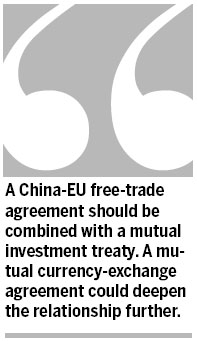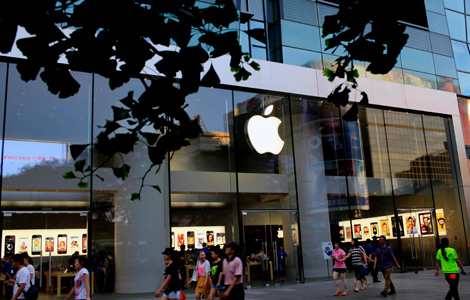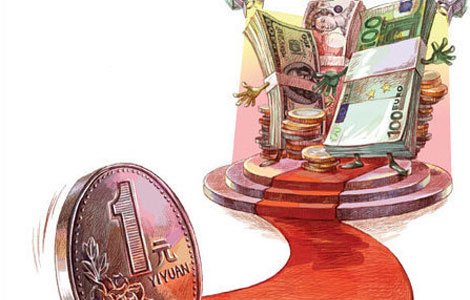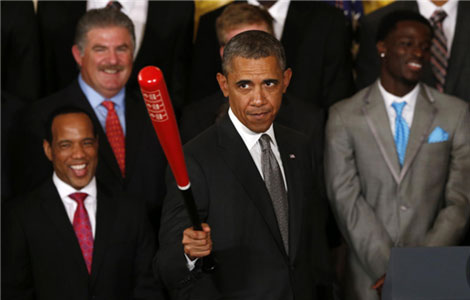Time to embrace a shared vision
Updated: 2013-07-25 07:20
By Wang Yiwei (China Daily)
|
||||||||

The world's largest developing country and biggest bloc of developed countries need to deepen their strategic partnership
Many Europeans believe that China, one of the European Union's 10 so-called strategic partners, behaves more like a competitor. And many Chinese, for whom the EU is just one of more than 70 strategic partners, complain that the EU's policy toward China is more commercial than strategic.
Such grievances are rooted in different interpretations of the nature and purpose of strategic partnerships. Where China sees an enduring, comprehensive, and stable relationship that extends beyond everyday issues, Europe sees market access and better global governance, but lacks a clear long-term vision for the partnership. Unresolved issues - for example, the EU's embargo on arms sales to China, its unwillingness to grant it market-economy status, and the recent anti-dumping and countervailing-duties cases it has brought against the Chinese - have aggravated these divergent perspectives.
For China, the value of a partnership with the EU lies in three main areas. First, it offsets "Americanization" - that is, the influence of the United States over global economic development, and the spread of the US lifestyle and mentality. The EU's global influence - won through its peacekeeping missions, diplomatic efforts, aid provision, and non-traditional security mechanisms - counterbalances US domination over the international community.
Second, the EU, with its technical, financial, and market strengths, is China's largest trade partner and a major source of technology transfer. It has respected China's values, while sharing knowledge, skills, and innovations that support China's modernization and efforts to increase domestic demand.
Finally, the EU's emphasis on harmonious development has served as an example for China's peaceful rise. Indeed, China's 12th Five-Year Plan (2011-15) shares some features with the EU's Horizon 2020 strategy for sustainable, smart, and inclusive growth.
But the EU lacks a coherent strategy for engaging with China, and its ongoing identity crisis over whether it is a single super-state or a bloc of individual states is impeding its ability to define a more effective approach.
As it stands, China-EU relations are based largely on economic and trade linkages. But these connections are unlikely to develop further in the foreseeable future, given weakening EU demand. Moreover, while some EU countries, such as Germany, benefit significantly from China's economic development, others view competition from China as problematic.
The partnership's limited strategic dimension largely reflects the concerns of the EU's three biggest members - the United Kingdom, France, and Germany. Given that EU institutions tend to play the "bad cop," so that member states can assume the role of "good cop," the EU has become associated with disappointment for China.
The relationship also suffers from diplomatic asymmetry, with the EU stronger on multilateralism and China stronger on bilateralism. Thus, as global multilateralism has given way to increased bilateralism in recent years, the EU's strategic clout has declined.
In a bid to retain its international authority - and to prevent an increasingly influential China from setting new standards for international trade - the EU has been pursuing an ambitious trade and investment agreement with the US. This, along with China's diminished role in World Trade Organization trade-liberalization talks, brought about by the failure of the Doha Development Round, has placed further strain on the EU-China relationship.
Strategic players must adopt a more realistic approach. China and the EU are not operating on a level playing field. Given that China is still modernizing, it reaps more benefits from globalization than the EU, which is moving toward a post-modern stage of development. This discrepancy has prevented strategic bilateral cooperation on global governance issues.
In fact, most EU countries - with the notable exception of Germany - are in decline, leading a conservative and defensive Europe to become preoccupied with its own commercial interests. Nevertheless, many people in the EU still believe that the EU has sufficient power to achieve its goals vis--vis China.
The US' involvement complicates the bilateral relationship further. The EU's security policy is largely determined by NATO, so it is aligned with that of the US. And the renminbi's peg to the US dollar gives the US leverage to check China's strategic choices. China's financial dependence and the EU's security dependence on the US mean that the US wields ultimate influence over China-EU relations.
Several measures could nonetheless strengthen the China-EU strategic partnership. First, both sides should build on their economic relationship by pursuing more strategic trade policies - for example, China could sell rare earth minerals to the EU rather than to Japan - and expanding their ties to include financial cooperation. In order to boost investment, a China-EU free-trade agreement should be combined with a mutual investment treaty. A mutual currency-exchange agreement could deepen the relationship further.
Reform of the international monetary system is also essential. Along with the US dollar, the euro is a leading reserve currency, and once internationalized the renminbi could potentially become one as well. The EU and China have a growing interest in making the international monetary system more balanced, sustainable, secure, and inclusive.
The time has come for the world's largest developing country and largest bloc of developed countries to define and deepen their strategic partnership. In order to overcome challenges posed by the EU's ongoing identity crisis, China must promote consistency within and outside the EU and facilitate the EU's efforts to retain its global clout. For its part, the EU must encourage China's full participation in global governance.
The author is director of the China-Europe Academic Network and a professor at Renmin University of China. Project Syndicate.
(China Daily 07/25/2013 page8)

 Death toll in Spain train crash rises to 56
Death toll in Spain train crash rises to 56
 Royal baby named George Alexander Louis
Royal baby named George Alexander Louis
 'The Grandmaster' takes center stage
'The Grandmaster' takes center stage
 Fewer Chinese consumers picking Apple's iPhone
Fewer Chinese consumers picking Apple's iPhone
 Yuan: Financial capitals vying for top spot
Yuan: Financial capitals vying for top spot
 Little princes and princesses
Little princes and princesses
 Obama lauds Louisville in White House visit
Obama lauds Louisville in White House visit
 PLA special forces hold military contest
PLA special forces hold military contest
Most Viewed
Editor's Picks

|

|

|

|

|

|
Today's Top News
Snowden's hopes of leaving airport dashed
US extends review of Shuanghui, Smithfield merger
'Few hundred' at Manila anti-China rally
Obama, Congress both losing public support
Abe seeking to 'contain' Beijing
Li points way for railways reform
VP visits Pyongyang for 60th truce anniversary
Palace: Royal baby named George Alexander Louis
US Weekly

|

|






